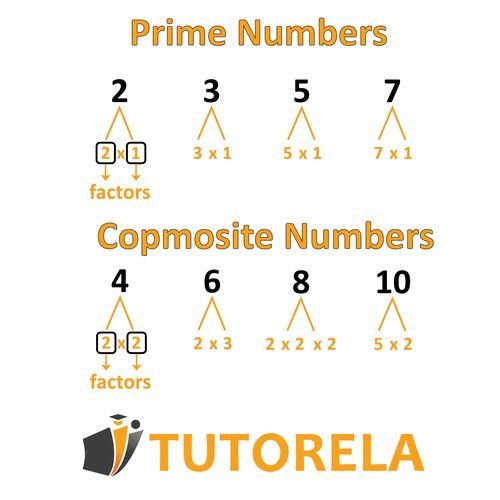A prime number is a natural number that is divisible only by itself and by .
Prime and Composite Numbers Practice Problems Online
Master prime and composite number identification with interactive practice problems. Learn to distinguish primes from composites using factor analysis and division rules.
- Identify prime numbers by testing divisibility by 1 and themselves only
- Recognize composite numbers through factor pair identification and multiplication
- Apply the special rule that 2 is the only even prime number
- Understand why 1 is neither prime nor composite using mathematical definitions
- Practice factoring composite numbers into products of smaller natural numbers
- Solve real-world problems involving prime and composite number classification
Understanding Prime Numbers and Composite Numbers
Definitions of Prime Numbers and Composite Numbers
Prime number
Composite number
A composite number is a number that can be written as the product of two natural numbers smaller than it, with the exception of and itself.
The number –> is a special number that is neither prime nor composite.
The number –> is the only even number that is prime.

Practice Prime Numbers and Composite Numbers
Which of the numbers is a prime number?
Examples with solutions for Prime Numbers and Composite Numbers
Is the number equal to prime or composite?
A number is classified as prime if it has exactly two distinct positive divisors: 1 and itself. Conversely, a number is composite if it has more than two divisors.
Given the number , we need to determine whether it is prime or composite.
Let's test the divisibility of 10 by numbers other than 1 and 10:
- Check divisibility by 2: Since 10 is an even number, it is divisible by 2. Specifically, with no remainder.
- Check divisibility by 3: , which is not an integer, hence not divisible.
- Check divisibility by 5: with no remainder, showing divisibility by 5.
Since 10 is divisible by numbers other than 1 and itself (specifically 2 and 5), it is not prime. Therefore, the number 10 is composite.
In conclusion, the number 10 is a composite number.
Answer:
Composite
Is the number equal to prime or composite?
To determine if is prime or composite, we need to examine its divisors.
- Step 1: Identify divisors of 20, other than 1 and 20 itself.
Since 20 is an even number, it is divisible by 2. So, 2 is a divisor of 20. - Step 2: Check divisibility by other small numbers:
- 20 divided by 4 equals 5 (another divisor).
- Additionally, , confirming 5 is also a divisor.
Since 20 has divisors other than 1 and itself (including 2, 4, and 5), it is not a prime number.
Therefore, the number is Composite.
Answer:
Composite
Is the number equal to prime or composite?
To solve this problem, we'll determine whether is a prime or composite number.
We follow these steps:
- Step 1: List possible divisors of other than and itself.
- Step 2: Test for divisibility by these numbers.
- Step 3: Conclude based on the results.
Step 1: The numbers to consider are up to the square root of , rounded up, which is approximately 4.7. Thus, feasible numbers are .
Step 2: Check each number:
- a whole number? Yes, .
Step 3: Since is divisible by , it has at least one divisor other than and itself.
Therefore, is a composite number.
Thus, the correct choice from the given options is: Composite.
Answer:
Composite
Is the number equal to prime or composite?
To determine whether 36 is a prime or composite number, we need to check if it has divisors other than 1 and 36:
- Step 1: Calculate the square root of 36, which is 6. This means we only need to test divisibility by numbers up to and including 6.
- Step 2: Check divisibility by 2. Since 36 is an even number (divisible by 2), it has a divisor other than 1 and itself.
Therefore, since 36 is divisible by 2 (and also by other numbers such as 3, 4, and more), it has divisors other than just 1 and 36. This means it cannot be a prime number.
Conclusively, the number 36 is Composite.
Answer:
Composite
Is the number equal to prime or composite?
To solve this problem, we'll determine if 42 is a prime or composite number by checking its divisibility by numbers other than 1 and itself.
A number is prime if it has exactly two distinct positive divisors: 1 and itself. It is composite if it has more than two distinct divisors.
Let's find the divisors of 42:
- (evenly divisible, so 2 is a divisor)
- (evenly divisible, so 3 is also a divisor)
- (evenly divisible, so 6 is another divisor)
- (evenly divisible, so 7 is a divisor)
- (evenly divisible, so 14 is a divisor)
- (evenly divisible, so 21 is a divisor)
From the above list, we can see that 42 has divisors other than 1 and itself, namely 2, 3, 6, 7, 14, and 21. This means that 42 is not a prime number.
Therefore, the number 42 is a composite number.
Answer:
Composite